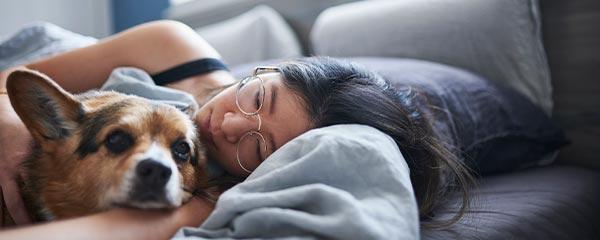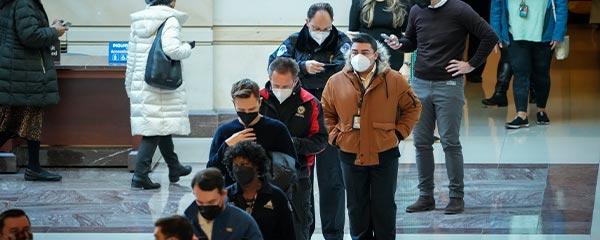Story Highlights
- Poor sleepers report more than double the rate of unplanned absenteeism
- Sleep quality similar between those inside and outside the workforce
- Turnover higher among poor-sleeping workers
Editor's Note: The research below was conducted in partnership between Casper and ║┌┴¤═°.
WASHINGTON, D.C. -- Workers who typically get a poor night's sleep -- estimated to be 7% of the U.S. workforce -- report more than double the rate of unplanned absenteeism compared with other workers, resulting in an estimated $44.6 billion in lost productivity each year.
Poor sleepers reported 2.29 days of unplanned missed workdays in the past month due to poor health, compared with 0.91 days for all other workers. These estimates are after controlling for factors that can affect both sleep and health-related absenteeism, including all major demographics, general overall health, clinical depression/anxiety, significant daily stress and COVID-19.
| Missed days prior month | Share of total workforce | Total full-time workers | Total part-time workers | Annual cost for full-time workers | Annual cost for part-time workers | |
|---|---|---|---|---|---|---|
| Mean | % | (In millions) | (In millions) | (In billions) | (In billions) | |
| Non-poor sleepers | 0.91 | 93 | 121.71 | 24.22 | Baseline | Baseline |
| Poor sleepers | 2.29 | 7 | 8.04 | 1.60 | $40.59 | $4.04 |
| Jan. 11-17, 2022 Controlling for age, gender, annual household income, education, race, ethnicity, general health, clinical depression/anxiety, significant daily stress and COVID-19. "Poor sleepers" respond "poor" to the question: "Thinking about the last 30 days, how was your sleep in general? Excellent, very good, good, fair or poor?" |
||||||
| Casper/║┌┴¤═° | ||||||
Workers' sleep quality is based on respondents' self-reports of how well they slept in the past 30 days -- as either excellent, very good, good, fair or poor.
║┌┴¤═°'s analysis of unplanned absenteeism by sleep quality is based on a generalized linear regression model. Considerations such as age, poor physical health or poor mental health are already included by the model in the absenteeism estimates. As such, poor sleep has been isolated as a primary factor in explaining absenteeism independent of health-related factors.
The analysis assumes 129.75 million full-time workers and 25.82 million part-time workers in January 2022, with an average (inflation-adjusted) hourly wage of $38.18 (Pfeffer, Witters, Agrawal & Harter, 2020). Among full-time workers, the extra lost workdays reported by poor sleepers (representing 8.04 million workers) compared with all other workers is estimated to be 132.90 million. Among part-time workers (representing 1.60 million workers), this is estimated to be 13.22 million (after accounting for part-time status). Workers under the age of 18 -- 0.23% of the U.S. workforce -- are excluded from the analysis.
These results are part of a major study by and ║┌┴¤═° to study sleep quality, sleep-related behaviors and the importance of sleep among American adults. The survey was conducted by web Jan. 11-17, 2022, with 3,035 adults, aged 18 and older, living in all 50 U.S. states and the District of Columbia, using the ║┌┴¤═° Panel.
Full study results can be found in the new Casper-║┌┴¤═° , which provides a comprehensive look at Americans' sleep.
General Sleep Quality of Workers Similar to Non-Workers
The sleep quality between employed and non-employed adults is similar. When asked to rate their sleep quality over the prior 30 days, 27% of both groups reported either "excellent" or "very good" sleep. Those who are outside the workforce are slightly more likely to suffer lower-quality sleep -- 37% report only "fair" or "poor" sleep, compared with 32% of those inside the workforce.
| Employed (by self or employer) | Not employed | |
|---|---|---|
| % | % | |
| Excellent | 5 | 6 |
| Very good | 22 | 21 |
| Good | 40 | 36 |
| Fair | 25 | 28 |
| Poor | 7 | 9 |
| Jan. 11-17, 2022 | ||
| Casper/║┌┴¤═° | ||
Poor-Sleeping Workers More Likely to Change Jobs
Many factors influence turnover in the workplace, principal among them , employee wellbeing and the critical role of the in influencing both. The combination of has a demonstrated cumulative effect in reducing the chances of turnover.
Wellbeing is shown to have a clear link to sleep as well as to relate to , another source of poor sleep. And engagement is proven to mitigate factors that trigger poor sleep, such as commute time-related stress. As such, poorly engaged workers or workers with poor wellbeing (or both) would also be expected to get lower-quality sleep, and the very act of changing jobs could result in poorer sleep than usual.
Consistent with these relationships, workers who don't sleep well are more likely to report having changed jobs in the prior 12 months, either voluntarily or involuntarily. Workers who rate their typical sleep as either excellent or very good changed jobs at a rate of 16% in the prior 12 months, compared with 19% of good sleepers, 22% of fair sleepers and 27% of poor sleepers. As such, if all full-time workers changed jobs at the same rate as excellent or very good sleepers, the resulting reduction in turnover would be 980,557 jobs each year, saving U.S. employers $32.4 billion in replacement costs.
| Turnover rate | Percentage of workers | Total full-time workers | Replacement cost at $33K per replacement | |
|---|---|---|---|---|
| % | % | (In millions) | (In billions) | |
| Excellent/Very good sleep | 16 | 27 | 35.16 | Baseline |
| Good sleep | 19 | 41 | 52.81 | $8.99 |
| Fair sleep | 22 | 25 | 32.96 | $13.10 |
| Poor sleep | 27 | 7 | 10.73 | $10.27 |
| Total incremental replacement costs | $32.36 | |||
| Jan. 11-17, 2022 Turnover rate measured by: "Have you changed employers in the last 12 months?" Sleep quality measured by: "Thinking about the last 30 days, how was your sleep in general? Excellent, very good, good, fair or poor?" |
||||
| Casper/║┌┴¤═° | ||||
Implications
The importance of good/high-quality sleep to the economy is significant. With about 155 million workers (full- and part-time) in the U.S. workforce, the 7% who report poor sleep over the prior month represents an estimated 11 million persons in the formal workforce who are executing their jobs with substandard levels of restfulness, followed by another 25% who report only fair sleep. Poor sleepers are so routinely inadequately rested that unhealthy days resulting in missed work are more than doubled compared with all other workers, independent of other health-related issues. And lack of sleep does not merely result in poor rest. Research has shown that it also impairs a person's ability to focus and learn efficiently and to consolidate memory, critical aspects of a functioning workforce.
For leaders who embrace a wellbeing culture in their workplace, elevating the importance of sleep within wellbeing-related intervention programs is likely to yield a substantial return on their investment given the percentage of employees who sleep poorly. This includes education on the importance of exercise, healthy eating and stress/worry management (including not worrying about the act of falling asleep itself), as well as the importance of sticking to a bedtime routine with consistent bedtimes and waketimes, exchanging reading books for staring at screens before sleep, investing in a pillow that maximizes comfort, and using mattresses that are appropriately supportive of the spine and distributive of temperature. By treating sleep as a major mechanism for improving employee wellbeing, employers can simultaneously improve the lives of their workers along with business outcomes that are critical to their success.
Read the full .
To stay up to date with the latest ║┌┴¤═° ║┌┴¤═° insights and updates, .
Learn more about how the works.




